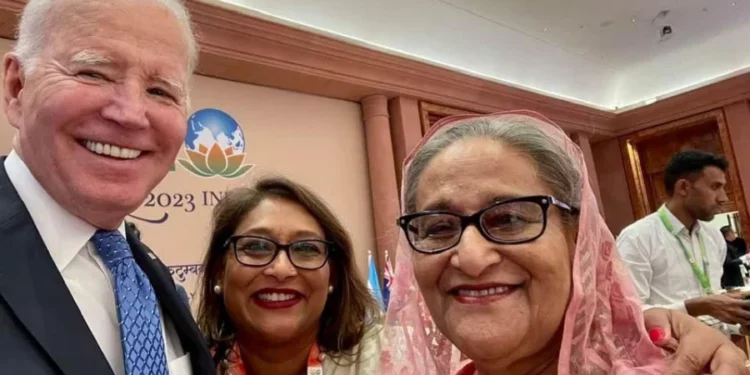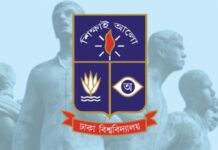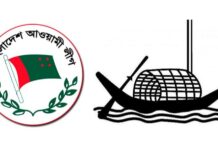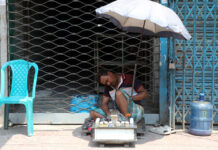Dhaka must see reason and take concrete and credible steps to ensure that free, fair and truly participatory elections are held in the country

The famously contrived selfie featuring US President Joe Biden, Bangladesh Prime Minister Sheikh Hasina and her daughter Saima ‘Putul’ Wazed, taken during the G20 meet in New Delhi on September 8, suddenly appears today to be bereft of any significance.
The only meaning that can be read in the image is one of polite and civil behaviour which was sought to be brazenly used to project a picture that everything – between the United States and an Awami League-ruled Bangladesh – was hunky dory.
Until now.
As the US State Department’s press note ‘Taking Steps to Impose Visa Restrictions on Individuals Involved in Undermining the Democratic Election Process in Bangladesh’, issued on September 22 evening, hit the ruling Awami League like a thunderclap, it brought into sharp relief one inescapable fact: charm offensives rarely work in inter-state relations and especially when one of the parties involved systematically demolishes democratic institutions, severely curbs the civil rights and liberties of the people, constrains the space for legitimate political opposition, unleashes the full might of a violent state on its citizens and takes the country towards economic ruination.
The note warns that the US is “taking steps to impose visa restrictions on Bangladeshi individuals responsible for, or complicit in, undermining the democratic election process in Bangladesh. These individuals include members of law enforcement, the ruling party, and the political opposition”. These restrictions come close on the heels of the European Union’s decision to not send elections observers to Bangladesh.
This is a strongly-worded statement and the US must now match intentions with decisive action. For years – at least since the questionable elections of 2014 – the Sheikh Hasina regime dared the international community in general and powerful Western states in particular to take action against it when all it did in the nine years was to violate all tenets of democratic governance, destroy the lives and liberties of Bangladesh’s hapless citizens, loot and plunder public money in the name of development, violently shrink the political space for the opposition and subvert institutions to stay in power.
What is worse is that it successfully enlisted the support of neighbouring India by repeatedly holding up the spectre of Islamist resurgence. Dhaka consistently deployed the bogey of no-one-but-Hasina to ensure New Delhi’s support which has been as cynical in its continuing courting of the Awami League. New Delhi’s concerns about the BNP’s “anti-India” outlook and the support for Islamists within Bangladesh may or not be justified but it has certainly exhibited lethargy and indolence in its policies towards its eastern neighbor by banking far too much on a party that has long outlived its utility. Old and tired phrases also come with frayed edges.
If New Delhi continues to do business with the Awami League and the Sheikh Hasina government, especially when Chinese steps have now turned into long strides in Bangladesh, it will have to tread an uncomfortably fine line.
The US State Department note underscores an important point – visa restrictions constitute a punitive action. This means that “members of law enforcement, the ruling party, and the political opposition”, besides “current and former Bangladeshi officials, members of opposition and ruling political parties, and members of law enforcement, the judiciary, and security services”, who have significant interests, personal or official, in the US will be debarred from entering that country.
Many Bangladeshi politicians, bureaucrats, businessmen, senior police officers (serving or otherwise) and defence officers have properties in the US and children and other relatives living in that country. The visa restrictions, which appear to have already kicked in, will certainly hit them hard.
Unconfirmed reports suggest that the number of visa shaheeds that find place on the restricted list could be as high as 417.
The visa restrictions notwithstanding, the US must now take other steps in Bangladesh to ensure that the Awami League does not cock a snook at the warnings or try to defy them or circumvent them in ways to bend the electoral rules to its favour and advantage.
From all available indications and reports emanating from Bangladesh, the incumbent Awami League has for some time been resorting to strategic and tactical placement of politically subverted officials in the administrative divisions, districts and sub-districts.
It is this government-party machinery that it will seek to deploy during the elections to seek unfair advantage of its electoral rivals.









